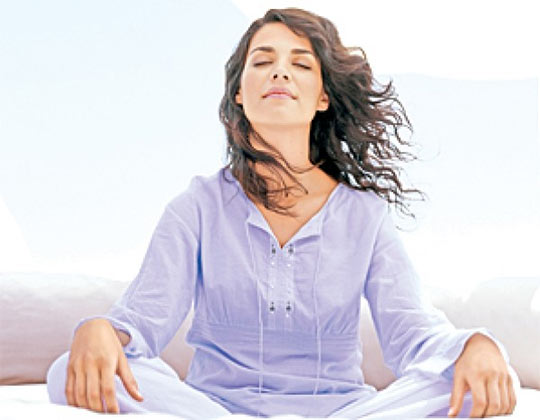Words of Wellness: Focusing on the body to manage stress

Breeeeeeeathe.
Most of you probably already know that some stress is good. We need to activate some alertness and vigilance to function at our best. Stress activates the Sympathetic Nervous System (SNS) of the Autonomic Nervous System (ANS). What we want is a nice fluctuation between sympathetic and parasympathetic engagement of our ANS. To paraphrase Robert Sapolski, Zebras don’t get ulcers because once they’ve survived the tiger chase, they realize they survive it and say something to themselves like “cool, it’s over for now” and then, they r-e-l-a-x. When the parasympathetic nervous system (PNS) dominates, the relaxation response kicks in and our blood pressure, heart rate, and levels of anxiety fall. We can rest, replenish, and repair all of our body cells, allowing the maintenance to take place that the body automatically does, when it is in parasympathetic mode.
If we can’t relax, drop our guard and let ourselves replenish every day, we start to wear out and the myriad of physical and psychological conditions that result can be significantly improved or eliminated if we manage our levels of stress physiologically, by attending to the body – mind.
Many people lack the physiological tools to adjust their levels of vigilance and guardedness and resort to chemicals, alcohol, weed etc…to impose a relaxation response on the bodymind. Sometimes that’s lovely but it’s not practical as the only go-to 24/7. So what can you do 24/7? To turn on the Parasympathetic NS, try these:
Breath work: voluntary acts of breathing with specific techniques can be used to turn off the sympathetic nervous system and turn on the parasympathetic nervous system and vise versa. When the sympathetic nervous system is dominant, the breathing is fast, short and shallow. When the parasympathetic nervous system is activated we breathe slower, deeper and longer, therefore if we intentionally breathe slower, deeper and longer we can turn on the parasympathetic nervous system. We can calm down, rev up or harmonize the nervous system with our breath. People with anxiety and chronic stress have habituated breathing that maintains or reactivates their sympathetic system, so they habitually, unconsciously crank out stress hormones into their bloodstream. Hit the reset by checking and shifting the breath.
In case you forgot how to breathe normally 24/7 (when at rest, not exercising, not responding to crisis) it’s like this: When you breathe in, you should breathe in slowly through the nose, not the mouth, until the lungs are almost full. When you exhale, it should be slow and until almost all air is expelled. Each breath should be deep, complete, long and slow. To breathe properly, when you inhale your abdomen should protrude, not your chest. When you exhale, your abdomen should flatten. Place your hands on your abdomen, if they rise and fall with each breath, then you are breathing correctly.
Now, to intentionally activate the Parasympathetic Nervous system and the relaxation response try these:
A cleansing breath: Inhale as deeply as you can, hold for a second or so, and then exhale through your mouth in a relaxed way. Just once. This expands the bronchioles of the lungs and activates the PNS to bring the bronchioles back to more normal size.
Breathe in to the count of five and exhale to the count of seven or longer. Long exhalations stimulate your vagal nerve, engaging your parasympathetic nervous system.
Focus your awareness on your body. Because the PNS monitors internal body states, bringing your awareness down into your body energizes that system. Even in the midst of a busy day, you can privately focus for one moment on the sensations of your belly expanding and contracting with each breath, the feeling of the chair that is supporting you while you sit, noticing your shoulders and inviting them to drop their tension, tensing and relaxing your muscles of choice.
Touch your lips – they are full of parasympathetic nervous system points. When you stimulate your lips, you are stimulating your parasympathetic nervous system. Ooh, what about kissing?!
Relaxation exercises: Many people have their own key methods, and here are a few of the most common – you can try them right now. Here are some “quickies” for relaxing without going to yoga camp:
Just relax your tongue and release your jaw. OK? Good. More?
Relax your eyes. The sympathetic nervous system is also affected by the position of the eyes as you breathe. Close your eyes, if possible. Closing your eyes enhances the benefits of your breath, because this immediately activates alpha brainwaves and incites relaxation. However, if it isn’t possible to close your eyes, the breathing alone will work as well. Try closing your eyes part way and defocusing. Let your eyes be soft (unfocused) and easy (still) as you do breath work. Invite yourself to release your eyebrows and forehead too.
Put your feet in contact with the ground. Imagine feeling all the stress and tension draining out of you through your feet and sinking deep into the earth. You can do this in class or while standing around.
Use your Sympathetic nervous system in the service of de-stressing. Exercising regularly helps to control and metabolize stress hormones. Exert yourself to spend the stress hormones that were released into your blood and neural streams for the fight or flight it was meant to be for. If you actually did fight or fly, you can skip this, you’ve already metabolized that shot of hormones. If you’ve been frozen or inert – get moving.
Drink water like it’s your job. At the very least, chug a glass upon awakening, midday and in the evening. Ideally though, drink 8-10 oz. every couple of hours. Just get it done, then if you want to dally around with sipping, fine. Your cells need it.
Eat enough protein during the day (at least 30 grams) and allow yourselves some carbs at night so the 5-HTP can cross through the blood brain barrier to make serotonin while you sleep, unless you need to be on some special diet. Proteins supply all of the amino acids your brain needs to make neurotransmitters. Eat fats so your cells can function.
There isn’t time to say more about it this column but make sure you get lots of probiotics. Eat unpasteurized fermented foods, pickles, yogurts, miso, etc. Studies are finding that when bad gut bacteria are unchecked by good flora, in addition to our immune systems being impaired we are more anxious or depressed and cautious in our behaviors.
Nourish yourself. Get enough sleep. Move your body. Have some fun. Get most of your work done. Meet most of your obligations or find a way to reduce them. Treat people the way you want to be treated. Take care of yourself as well as you take care of others. These are things we can control most days and they all significantly reduce stress and make life good.
Try these things on your own. If you need more help, take a yoga class; check out Amy Welch’s new research study; download some mindfulness sessions and listen while relaxing; and of course, you can come see us at the counseling center, we’ll be glad to help you get a better handle on managing stress.






